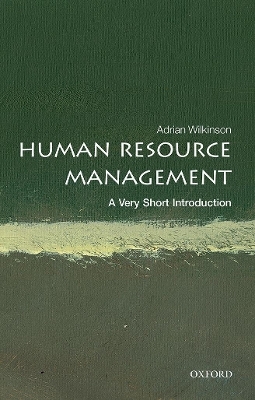
Human Resource Management
Oxford University Press (Verlag)
978-0-19-871473-6 (ISBN)
The way in which organizations manage their people has always been pivotal to their performance, long before formal human resource management coalesced into a definable and somewhat fashionable discipline in the mid-1980s. Earlier campaigns for worker welfare in the 18th and 19th century were driven by a mix of humanitarian, religious, philanthropic, and business motives, and sought workplace amenities such as medical care, housing, and libraries. At the same time functionaries and departments specialising in HR processes such as hiring, payroll, and record keeping emerged.
This Very Short Introduction describes how the key players and watershed moments in labour history shaped the state of human resource management today. In our era of globalization human resource management has to contend with a number of new and increasingly complex factors, such as global sourcing, regional trade agreements and labour standards, remote working, strategic alliances, and innovation driven by competition. As traditional sources of competitive advantage such as access to capital, protected markets, or proprietary technologies evaporate, firms increasingly look to human resource management to offer a competitive edge. In the 'laboratory' of university departments or in the gritty and sweaty reality of the shop floor, there is no single model of human resource management. Instead human resource management today is as able to impact everything from small owner-managed shops in Brick Lane to the high tech behemoths of Silicon Valley. Adrian Wilkinson shows how human resource management covers the relations between employees and their employers, and explores the range of HR practices, processes, and line management activities.
ABOUT THE SERIES: The Very Short Introductions series from Oxford University Press contains hundreds of titles in almost every subject area. These pocket-sized books are the perfect way to get ahead in a new subject quickly. Our expert authors combine facts, analysis, perspective, new ideas, and enthusiasm to make interesting and challenging topics highly readable.
Adrian Wilkinson is Professor and Director of the Centre for Work, Organisation, and Wellbeing at Griffith University, Australia. He holds Visiting Professorships at Loughborough University, and is an Academic Fellow at the Centre for International Human Resource Management at the Judge Institute, University of Cambridge. He has been shortlisted by HR magazine for the award of HR (Most Influential International Thinker). Adrian has authored/edited thirty books, including Contemporary Human Resource Management (2016), the Handbook of Research on Employee Voice (2014), and The Oxford Handbook of Employment Relations (OUP, 2014). He was elected as an Academician (Fellow) of the Academy of Social Sciences in the UK, as well as a Fellow of the Academy of Social Sciences in Australia.
1: What is Human Resource Management and why does it matter? 2: HRM: strategy and performance 3: Who does HRM and how? 4: Managing performance and rewards 5: Having a say at work 6: Saying goodbye? Downsizing - are Human Resources assets or liabilities? 7: ConclusionReferencesFurther ReadingIndex
| Erscheinungsdatum | 14.03.2022 |
|---|---|
| Reihe/Serie | Very Short Introductions |
| Zusatzinfo | 8 black and white figures |
| Verlagsort | Oxford |
| Sprache | englisch |
| Maße | 112 x 175 mm |
| Gewicht | 122 g |
| Themenwelt | Wirtschaft ► Betriebswirtschaft / Management ► Allgemeines / Lexika |
| Wirtschaft ► Betriebswirtschaft / Management ► Personalwesen | |
| Wirtschaft ► Betriebswirtschaft / Management ► Unternehmensführung / Management | |
| ISBN-10 | 0-19-871473-4 / 0198714734 |
| ISBN-13 | 978-0-19-871473-6 / 9780198714736 |
| Zustand | Neuware |
| Haben Sie eine Frage zum Produkt? |
aus dem Bereich


